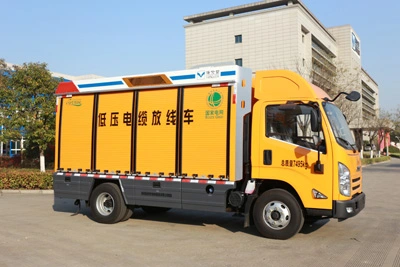
Accessibility and Flexibility: Handler's MEWPs provide unparalleled access to high and hard-to-reach areas, making tasks like maintenance, construction, and utility work much safer and more efficient. Their design allows for a range of motion that traditional scaffolding or ladders cannot match.
Enhanced Safety Features: Equipped with safety harness points, guardrails, and stabilizing technology, these custom emergency vehicles ensure the safety of operators working at heights. Advanced models may also include sensors to prevent collisions or tipping.
Customizable for Specific Needs: Depending on the model, these custom emergency vehicles can be customized with various attachments and tools, making them versatile for different tasks, from window cleaning to electrical repairs or tree trimming.
Initial Consultation: The process begins with a detailed discussion between the customer and Handler's specialists. This stage is crucial for understanding the specific needs, challenges, and objectives that the custom vehicle must address.
Requirement Analysis: Handler's team analyzes the requirements to determine the best base model and modifications needed. This might involve site visits or the examination of the operational environment where the vehicle will be used.
Preliminary Design: Based on the needs assessment, Handler's engineers and designers draft initial designs, focusing on the custom emergency vehicles' layout, specialized equipment, and any custom features requested.
Customer Feedback and Revisions: The preliminary designs are presented to the customer for feedback. This collaborative approach ensures that the final custom emergency vehicles will meet or exceed expectations. Revisions are made based on feedback.
Final Design Approval: Once the design meets the customer's requirements and expectations, it is finalized and approved for production. This stage may also involve regulatory compliance checks to ensure the vehicle meets all relevant standards.
Base Vehicle Selection: The process moves to selecting the appropriate base vehicle chassis and components that will form the foundation of the custom build.
Custom Fabrication and Assembly: Specialized components are fabricated, and the custom emergency vehicles are assembled according to the approved design. This includes installing custom equipment, modifying structures, and integrating technology systems.
Quality Control Checks: Throughout the production process, quality control checks are conducted to ensure that every aspect of the vehicle meets Handler's high standards and regulatory requirements.
Performance Testing: The completed custom emergency vehicles undergo rigorous testing to validate its performance, safety, and reliability. This might include road tests, equipment operation tests, and safety system checks.
Customer Inspection and Approval: Before final delivery, the customer is invited to inspect the vehicle and witness testing to ensure it meets their needs and expectations.
Delivery: Upon approval, the custom emergency vehicles are prepared for delivery. This may involve final detailing, documentation, and arranging transportation to the customer’s location.
Operator Training: Handler provides comprehensive training for the operators and maintenance staff to ensure they are fully equipped to use and maintain the vehicle effectively. This training can be customized to the complexity of the special vehicle solutions and the customer's requirements.